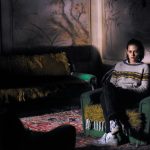Joyce Glasser reviews Wake in Fright (re-release, March, 2014)
The history of Canadian director Ted Kotcheff’s 1971 psychological thriller Wake in Fright is almost as fascinating as the film itself. If 82-year-old Kotcheff is best known today as the Producer of the TV series Law & Order: Criminal Intent, Wake in Fright
, Kenneth Cook’s novel of 1961
by British writer Evan Jones, inspired a generation of Australian directors, including Peter Weir and Fred Schepisi.
Though Mad Max and Walkabout are well known, Wake in Fright
seems to have suffered from poor marketing, resentment in Australia of yet another ‘English’ film presenting a ‘negative’ image of the outback, and a controversial kangaroo hunt scene. After being nominated for the Palme D’Or at the 1971 Cannes Film Festival, the film faded into obscurity, except in Paris.
The original negative, long lost in a vault in Pennsylvania, was found in 2004 after a 13-year search by the film’s indefatigable editor Anthony Buckley. The restored version was invited back to Cannes by guest curator Martin Scorsese, one of only two films in the festival’s history to be granted a second festival screening.
Now you can see the film, uncut and restored sufficiently to appreciate Kotcheff’s brilliant character study, atmospheric scenery and the hellish, but surprisingly accurate, portrait of the mining town of Bandanyabba (shot in the 45 degree heat of Broken Hill, Australia).
If the ‘Yabba’ is hell, it’s partly because we see it through the eyes of John Grant (British actor Gary Bond, best known for playing Joseph in the 1972 London production of Joseph and the Amazing Technicolor Dreamcoat), one of the great anti-heroes of 1970’s cinema. Grant is a handsome, tactless, self-pitying snob.
A city bred university graduate (he’s taking Plato’s Dialogues on holiday), he is a bonded teacher serving out his bond like a prison sentence in the blinding sun and limitless expanses of dry bush that is Tiboonda. The outpost consists of a one-room school house, a bar (where John rents a room) and a railway siding. It is from here that John catches a train to Bandanyabba for his Christmas break. After an overnight stop-over he plans to fly to the sea, the city and a pretty surfer girl in Sydney.
Or does he? Freud claims we never do anything by accident, and as many filmmakers of the 1970s showed us, it’s not the destination but the journey that counts. What happens to John in the Yabba is something that every cinema lover should experience in the cinema before reading about them.
The tension arises from our innate fear of John’s lack of self-discipline and his fish-out-of-water situation. While we initially fear the unpredictable, slightly sinister people John meets, by the end of the film we realise that his troubles are his own making.
Among the marvellous characters John meets are the overly-friendly cop Jock Crawford (Chips Rafferty), the hospitable Tim Hynes (Al Thomas), his lonely, predatory daughter, Janette (Kotcheff’s then wife, Sylvia Kay), the hard-drinking, psychopathic Kangaroo hunter Joe (Peter Whittle) among others) and the alcoholic ‘Doc’ Tydon (British actor Donald Pleasence) who exists on a diet of booze and kangaroo stew.
John meets the former Doctor in a greasy spoon and asks him sarcastically: “You mean you don’t think the Yabba is the greatest place on earth?”
“Could be worse.”
“How?”
”The supply of beer could run out.” As it happens, it does not.
The heat, the beer, the bond, and disillusionment about himself facilitate John’s descent to the depths of deprivation and humiliation. When he takes part in the shockingly brutal kangaroo slaughter (Kotcheff insists he was just filming what happens every night in the bush and no animals were killed for the film) he has not endured the worst.
That comes later in one of several off-camera shots (as if Kotcheff is sparing us the worst), but reminds us that John has never phoned his girlfriend to explain his long delay.
The novel’s/film’s title comes from an old curse: ‘May you dream of the devil and wake in fright.’ There are few buddy relationships in cinema as dysfunctional, and yet somehow touching, as that between John and Doc, a man determined to wake John up and strip him of his affectation and illusions.
Gary Bond and Donald Pleasence both died within months of one another in 1995; Pleasance of heart failure, age 75 and Bond of AIDS at the age of 55.
You can watch the film trailer here:





